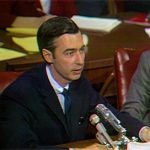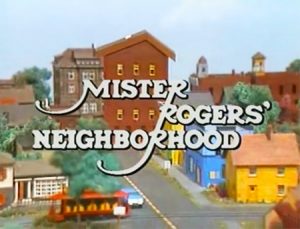It was 1969.
As the war in Vietnam peaked, President Nixon sought to cut $20 million in funding to public broadcasting.
The Senate Subcommittee on Communications held a hearing to assess the impact of this cut. Senator John Pastore, who had a reputation as a tough, impatient man, chaired the hearing.
Two days into the hearing, a 41-year-old Presbyterian minister who, a year before had begun hosting a national children’s show, spoke to the committee.
 He used stories and lyrics from children’s songs to build a narrative around the importance of helping children navigate everyday situations such as getting haircut, understanding divorce or grieving the loss of a pet.
He used stories and lyrics from children’s songs to build a narrative around the importance of helping children navigate everyday situations such as getting haircut, understanding divorce or grieving the loss of a pet.
After reading aloud the lyrics of one of his songs, Senator Pastore interrupted, “I’m supposed to be a pretty tough guy and this is the first time I’ve had goosebumps for the last two days.”
In six minutes, that man — Fred Rogers (aka Mister Rogers) — influenced a group of hard-nosed policymakers to support the $20 million in funding.
Fifty years ago today, on February 19, 1968, the first national broadcast of Mister Rogers’ Neighborhood aired on public television. It was in black and white. He entered through the front door in a trench coat and suit. And as he sang his classic song, “It’s a Beautiful Day in the Neighborhood,” he changed into his iconic sweater and sneakers.
The Practices of a Servant Leader
In many ways, things don’t seem to be much different today than they were in 1968.
Despite our being better off in many ways, violence and war still dominate our screens and news. Suicide, addiction and depression are claiming more lives, especially among our children and youth. The Trump Administration’s budget seeks to eliminate all federal funding to public broadcasting.
Of course, the focus of my writing isn’t politics and culture. I’m interested in how servant leadership can drive engagement and impact inside organizations and beyond. I’m interested in how we, through example and courage, can awaken and activate the hearts and minds of those we serve. And how, as leaders, we can see the familiar in unfamiliar, innovative ways.
Servant leaders, as taught by Robert Greenleaf, practice these core areas:
- Listening
- Empathy
- Healing
- Awareness
- Persuasion
- Conceptualization
- Foresight
- Stewardship
- Others’ Growth
- Building Community
These are practices we need in our businesses, schools and civic organizations today; practices we need to be modeling and mentoring with our next generation of leaders.
I believe these practices can bring lift to your sales, marketing, recruitment, customer service, fundraising and management efforts. I’ve witnessed this firsthand across companies of all sizes, models and stages.
It worked for Fred Rogers and his small production company, Family Communications, Inc.
In Search of Today’s Mister Rogers
I’ve felt myself asking who and where are today’s Mister Rogers?
 As they grow up, we tell our children that there is no Santa Claus. But, in reality, they’re are millions of Santa Clauses around the world. And we should invite and prepare the next generation to be one too.
As they grow up, we tell our children that there is no Santa Claus. But, in reality, they’re are millions of Santa Clauses around the world. And we should invite and prepare the next generation to be one too.
Mister Rogers passed away in 2003; however, his spirit is alive and well today.
I believe there are millions of Mister Rogers out there, starting with you and me.
On this 50th anniversary of the first national broadcast of Mister Rogers’ Neighborhood, let’s take the torch, put on some blue sneakers and run together to bring deep and simple care to those we serve: our family, our friends, our colleagues, our clients and our community. (I regularly wear blue Converse sneakers as a private reminder of Fred Rogers’ legacy.)
The world is smaller than we think. And we really are all neighbors, aren’t we?
An Invitation to Go Deeper…
- Can You Say Hero? This 1998 Esquire magazine story by Tom Junod is terrific. I read it at least once a year. And it’s the inspiration for an upcoming movie starring Tom Hanks.
- Watch the debut national broadcast of Mister Rogers’ Neighborhood.
- Mister Rogers & Me This is a terrific documentary on Fred Rogers’ life. It is currently available for streaming on Amazon Prime.
Keith Reynold Jennings is an executive and writer focused on the intersections of servant leadership and social impact. Connect through Linkedin, Twitter, Facebook or email him directly.